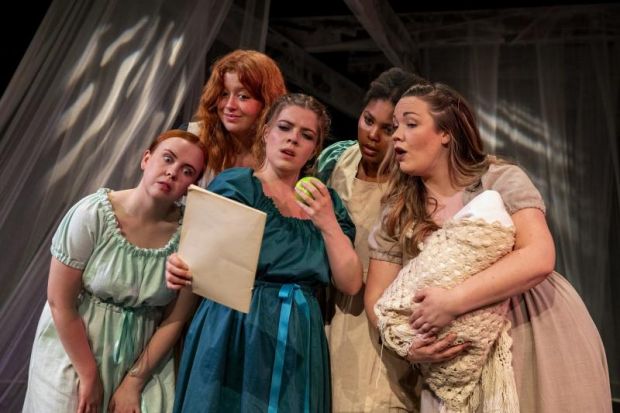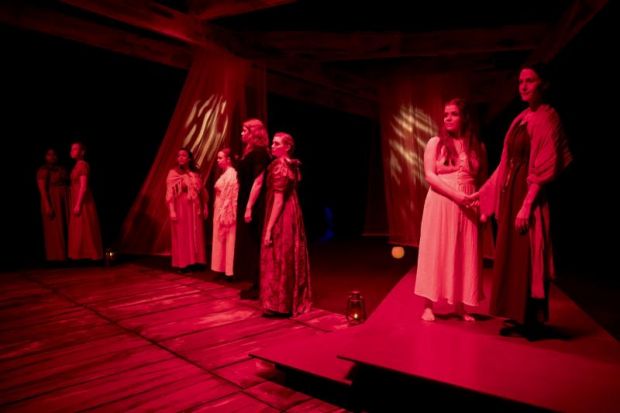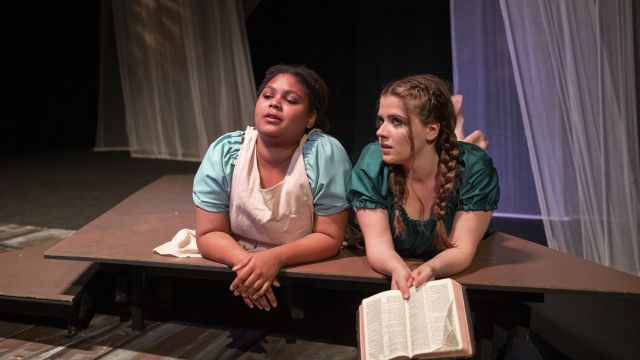The Ballad of Maria Marten
“We have tried to create beauty so that it can be mourned.” Louise Fischer, Director
Beth Flintoff’s play about an historic act of domestic violence that happened nearly 200 years ago is heart-breaking … but also very beautiful. Louise Fischer has caught that beauty in a delicately directed production that captures Flintoff’s desire to recreate Maria as a person rather than a victim, as a girl growing up as a mole catcher’s daughter in the village of Pulstead in the early 1800s. Her friends, her sense of fun, her intelligence, her openness. The hardships, the joys, the class system that ruled the society of the time. And the attitudes to women …

That Maria is portrayed insightfully by Naomi Belet, who finds the gentle, fun-loving imp that Flintoff imagined. Belet gives Maria an energy and brightness. She is light and buoyant, expressive and bewitching. She finds all the personality traits that Flintoff wrote for Maria – playfulness, maturity, understanding, compassion and vulnerability. It is a skilfully designed role and Belet, with Fischer’s intelligent, experienced guidance, finds “the intelligent, brave and wryly funny” Maria that Flintoff imagined.
Belet leads a strong female cast. Olivia Bartha, Kyra Belford-Thomas, Ali Bendall, Rhiannon Jean, Maddie Sherston, Zarah Stibbard and Jane Wallace play the women and two of the men – in Maria’s life. Every character is clearly defined. Each actor has found the ‘heart’ of their character and the strong message each sends from the past to the present.

Maddie Sherston’s Therese fights against admitting “her John’s” violence just as vehemently as frightened victims do today. Rhiannon Jean as Lady Cook retreats from unsuitable alliances just as those from ‘better’ families do today. Olivia Bartha as Peter Matthews gives in, albeit reluctantly, to the threat of disinheritance.
Ali Bendall shows the warmth of a women who accept who they are in the face of criticism and gossip. Sarah Stibbard finds the strength of women who stand by their friends and keep watch over them. Kyra Belford-Thomas shows a woman swaying between loyalty to her friends and the teachings of her religion. Jane Wallace, as Maria’s stepmother Ann, shows the loyalty of those who are given acceptance and love.

Fischer’s attention to detail ensures that the soft Suffolk dialect, carefully coached by Benjamin Purser, is as important to the production as the period costumes designed by Deborah Mulhall. The high waisted day dresses of the young women, their long cotton work pinafores; the more elegant gowns of the gentry; the knee britches, white stockings and tailed jackets of the gentlemen all set the production carefully in its place and period.
Mulhall’s choice of colours – pastels and shades of green – are offset by the tight, white, translucent curtains of Tom Bannerman’s set. Hung across a series of high, wooden beams, symbolising the barn where Maria died, the filmy fabric, lit inventively by Michael Schell, suggests places to hide and listen, and the perspectives of distance and time that overly the story.
Moments of joy in the production are accentuated with music and dance, carefully selected and choreographed by the multi-talented Naomi Belet and Ali Bendall. The dances bring lightness, the music a little solemnity at special moments, especially in one of the early scenes.

Fischer make that space and distance intrinsic to the production by using different levels and shapes in her blocking. The spaces between the curtains, a step stage left, a lone spot down stage right, allow her to create ‘pictures’ that give more dimension to one scene, more intimacy to another; more detachment between the classes, more isolation. Her cast present these pictures deftly in clear, layered characters who, as they deal with classism, invisibility, victimisation, and violence, seem to cry out “why are things still the same?”.
Flintoff wanted her play to make Maria’s story “not about the past but the present”. Louise Fischer and her very clever, receptive cast make that point poignantly in this moving, carefully judged production.
Carol Wimmer
Photographer: Bob Seary
Subscribe to our E-Newsletter, buy our latest print edition or find a Performing Arts book at Book Nook.

